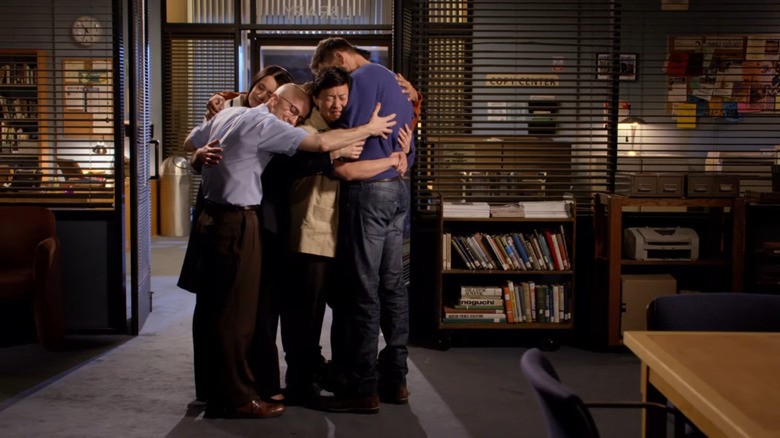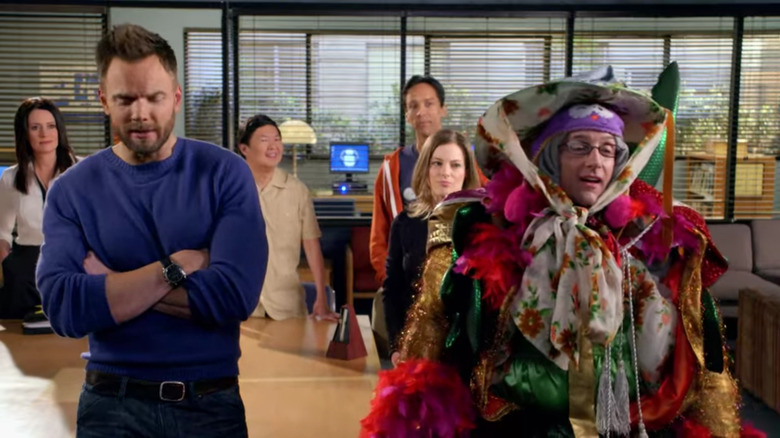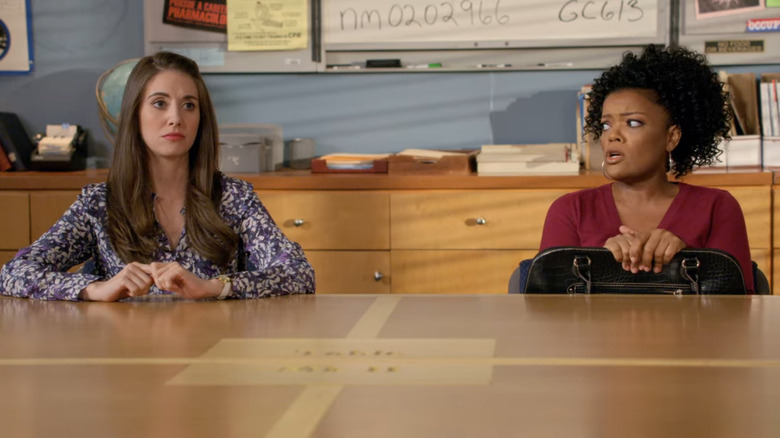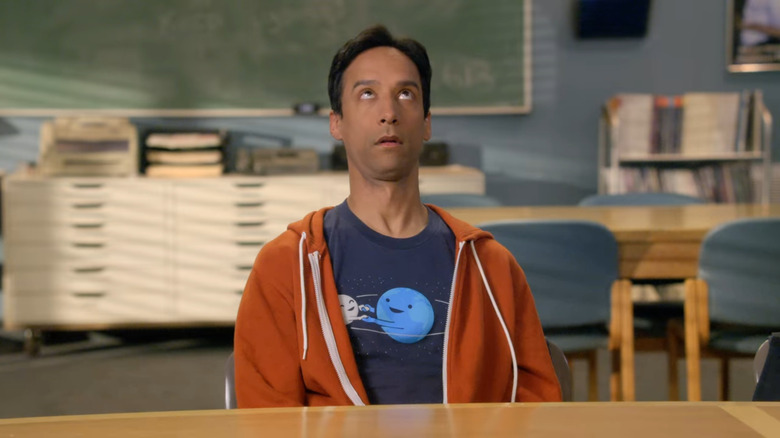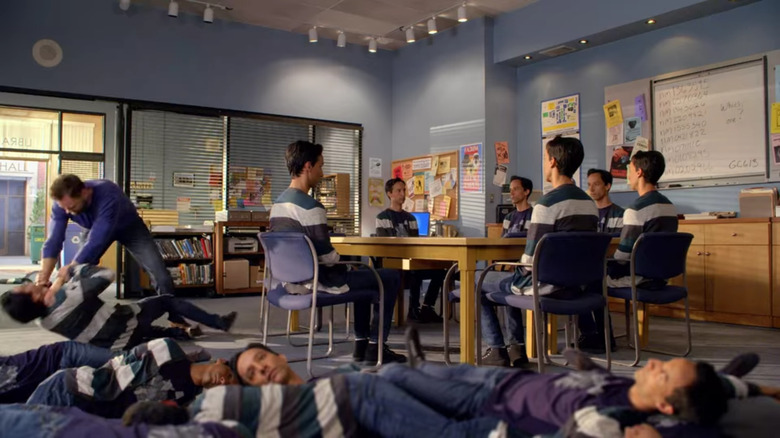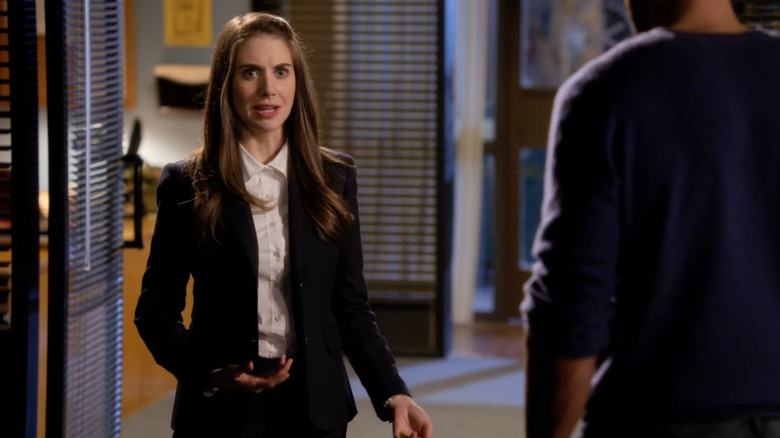Community Ending Explained: Going Meta The Right Way
In today's media landscape, breaking the fourth wall isn't all that unique. Six years after "Deadpool" had its lead character scrape gum off the camera, meta jokes in film and TV tend to feel kind of overplayed now. Even when superhero movies don't explicitly break the fourth wall, they do feel strangely compelled to throw in self-aware jokes that undercut any sense of narrative tension or real emotion, and at this point it's just exhausting. No, "Spiderman: No Way Home," we don't need you to throw in a 10-second gag where the main characters marvel at how silly Otto Octavius's name is. Why do you feel the need to do this?
Even "Community" showrunner Dan Harmon's later sitcom, "Rick and Morty," goes a little overboard with this. They can't just let Rick tell Morty his tragic backstory in the season 5 finale; they need to have Rick first acknowledge that this is his long-awaited backstory. They can't tell a normal story; they feel the need to point out every little trope within the story the moment it shows up. At one point, these self-aware lines might've been funny, but today it just seems like the writers trying too hard to remind us how smart and trope-savvy they are.
Meanwhile, the "Community" series finale is a prime example of meta comedy done right. It's an episode where the characters seem implicitly aware that they're existing inside the season 6 finale of TV show, but this awareness doesn't undermine the emotional stakes. Rather, it heightens the stakes in a fascinating way, leading to one of the most thoughtful sitcom finales of all time.
Clinging to the idea of a season 7
The opening scene of "Emotional Consequences of Broadcast Television" doesn't really feel like the start of a finale, up until when Elroy (Keith David) says his sudden, non-committal goodbye. When he's asked if he'll ever return, he says, "I think so... Probably... Maybe... Have a great summer."
There's a look of barely constrained dread on the face of Jeff (Joel McHale) as he realizes Elroy's probably leaving for good, and it's Jeff who the finale will focus on most of all. More so than any of the cast, Jeff doesn't want the group to disband. He doesn't want the show to end. As important cast members left the series in season 5 and 6, Jeff's been shown to cling harder to the group than ever before. Whereas season 1 Jeff saw the study group as a temporary means to an end, by season 5 Jeff has fully embraced the group as an important part of his life.
Unfortunately for Jeff, season 5 is also when the group starts falling apart. First Pierce (Chevy Chase) leaves, which the show handles smoothly. But then Troy (Donald Glover) leaves, a major departure that nearly breaks the show. Season 6 begins with Shirley (Yvette Nicole Brown) having left the group off-screen, along with Professor Duncan, Buzz Hickey, and a couple other minor characters. Most sitcoms would call it quits after three main cast members leave, but "Community" kept going, even as it seemed painfully aware that the party was winding down.
Likewise, Jeff's known for a while that this is all ending, that the past year has at best been an extended epilogue to a mostly concluded story. It's with Elroy's departure that this idea becomes impossible to ignore.
Pitching season 7
After the opening credits, Abed starts talking about how he doesn't think a season 7 is likely. "What show ever peaks after season 6?" he asks. When Chang brings up shows like "The Simpsons," "South Park," "Friends," and "Seinfeld," Abed points out that none of those shows are losing as many major characters. The six main characters of "Friends" stick around for all 10 seasons, and it's hard to imagine the show lasting that long if even one of them had left early. When Britta asks him if Shirley coming back would fix things, Abed says, "Shirley could get us back on formula, but I don't see it turning us around."
What's their formula? Well, Abed shows us it in an imaginary opening scene of a standard season 7 episode. We get to see what a typical conversation between the group would look like, but with all the dialogue stripped down to their literal storytelling purposes. "Can we put a pin in the B story and focus on the A story?" Annie asks in a familiar tone. We realize we've heard Annie say this a million times already, just not in those words.
The formula of a typical "Community" episode is laid out bare in front of us, in a way that's funny (especially if you're interested in screenwriting) but also a little depressing. Having it spelled out so clearly takes some of the magic away. It's makes so much of what we love about the show feel like nothing more than the result of a well-calibrated machine. With Annie's line, all the writers have to do is replace "B story" and "A story" with whatever they actually are, and the line works perfectly in a standard episode. Is that all this show is?
Abed's the key
The only person in Abed's season 7 pitch who doesn't have any lines is Abed himself. When we do see him in the pitch, he's unable to speak; he's just sitting there, looking like he's having some sort of stroke. At first glance, this just seems like a result of Abed not being able to predict himself in the same way he's able to predict other people, but it's also about how valuable Abed is to keeping the group fresh. Abed's the one who relates the group's current shenanigans to a certain TV show or movie, so in a context-free version of events where the group is just saying script placeholders to each other, Abed has nothing unique to say.
Troy is often considered the heart of "Community," and Dan Harmon himself as stated that Donald Glover leaving was "the death of the show." However, I think most would agree with (or at least sympathize with) the argument that the heart of "Community" is Abed. At the very least, he's the glue that holds it altogether. Every good sitcom has at least one standout character that feels completely unique, that's eccentric in a way that sets the show apart from any typical sitcom, and Abed's always been that for "Community."
"Seinfeld" had George, "How I Met Your Mother" had Barney, "The Office" had Dwight, and "Community" has Abed. If he's not around anymore, that's pretty much it. This is why as the group goes through their various pitches for season 7, each a little more desperate than the last, it's not until Abed announces that he too is moving away that the realization hits home: the show is finally over. The show surviving Annie's departure would be tough, but surviving without Abed would be impossible.
Jeff comes to terms
Jeff starts to spiral a little once Abed tells everyone the news about his new job across the country. He goes from denial to anger awfully fast, fantasizing about strangling a study group full of Abeds. He leaves to go back to campus and look at the study group table, and has a fantasy of him and Annie getting married and having kids together. It's a fantasy that's unrealistic to both characters, which his fantasy-Annie points out, but he clings to it anyway because it seems like something stable.
The Jeff/Annie shippers had a wild ride in this episode, but ultimately this fantasy's barely about Jeff's feelings for Annie, but his larger feelings of not wanting to be abandoned. It's a fantasy where Annie not leaving is the prime focus, not necessarily the fulfilment of his romantic longing for her. Annie and Jeff have a heart-to-heart scene where they kiss for the first time since the season 1 finale, but again the focus is barely on the two as a couple. It's about Jeff coming to terms with change.
Change is easier for Abed and Annie because they're young, and the future is unpredictable and exciting for them. "I want to be 25 and heading out into the world," Jeff tells Annie. "I want to fall asleep on a beach and be able to walk the next day, or stay up all night on accident ... I want to have an opinion about those boring-ass Marvel movies." But as Annie reminds him, being young isn't always fun, and there are benefits to middle age. "I want to have so much behind me I'm not a slave to what's in front of me," she says, "especially these flavorless, unremarkable Marvel movies." Wise words, Annie.
Embracing change
"Community" ends in a similar note to the way "The Good Place" ends, by contemplating the fact that everything ends, and that this isn't necessarily a bad thing. After all, if the show went on forever, it would inevitably become tired and soulless. We've seen from "The Simpsons" just how depressing it can get if a show goes on too long, so it's for the best that "Community" leaves while we still want it around.
The meta nature of the finale works because, unlike so many of those flavorless Marvel movies Jeff and Annie complain about, the meta problem of the show's inevitable death naturally ties into Jeff's fear of change, and his fear of his own death. Jeff's notoriously stressed about his age, to the point where turning 40 leads him towards a mental breakdown where he nearly dies of an overdose in season 5. The fans don't want the show to end just as Jeff doesn't want to leave this stage of his life, but like Jeff we're forced to accept this changing reality anyway.
One of Jeff's final moments is him saying goodbye to Annie and Abed at the airport. He hugs Abed, looks at him for a moment, then hugs Abed again. It's an openly emotional gesture from a man who famously keeps his emotions close to his chest. Jeff's gone through his five stages of grief and has landed on acceptance; he's gonna miss Abed and Annie, but he's still going to wish them the best as they go on to the next chapter in their lives. Jeff's the audience surrogate in this episode, and it's through him that "Community" asks us to make peace with the show ending. It was fun while it lasted, but it's time to move on.
